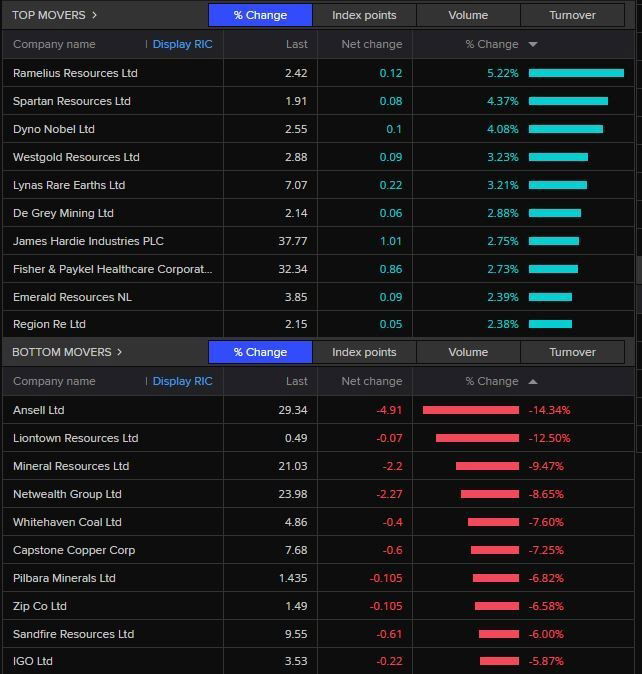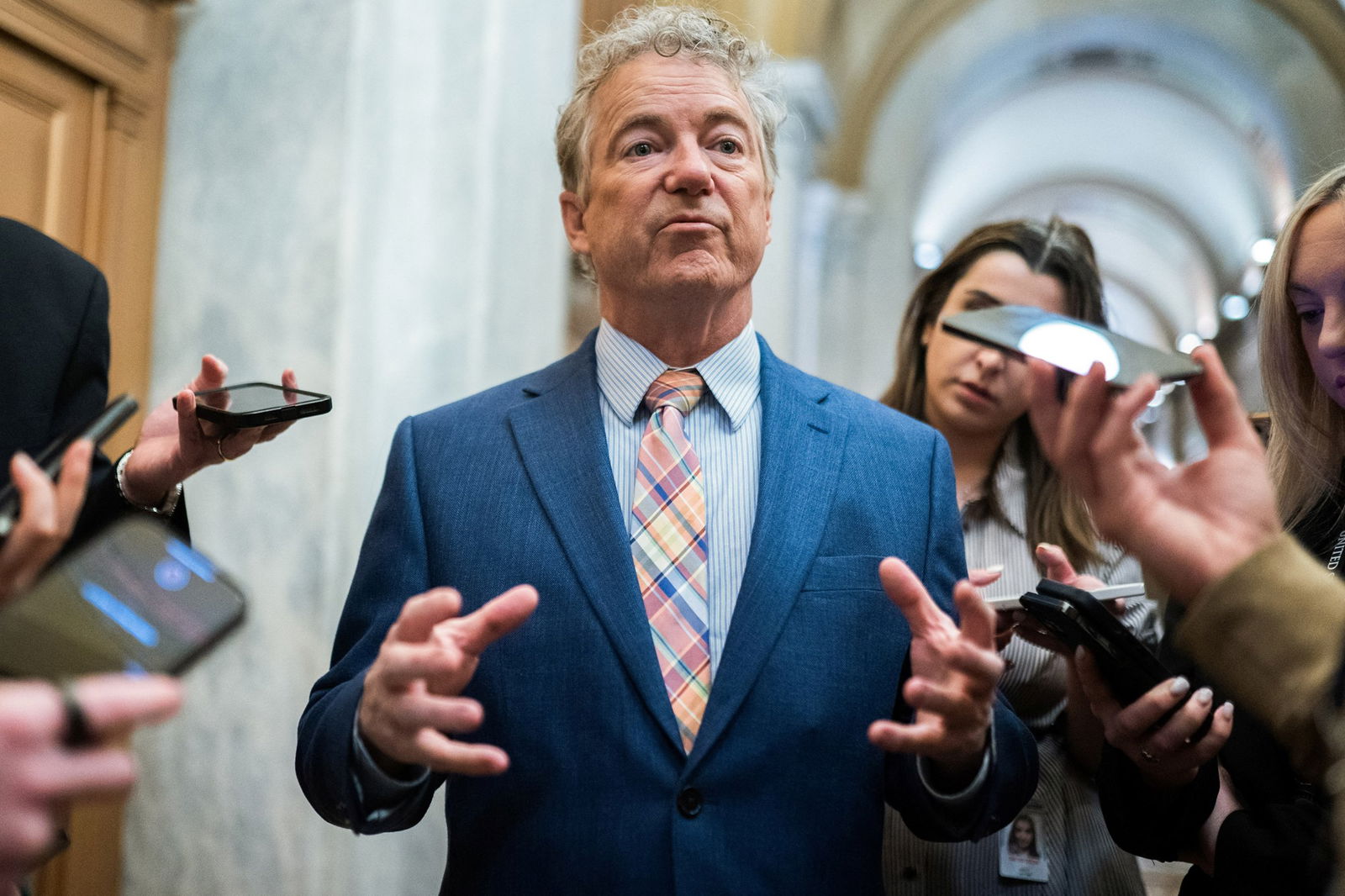ASX tumbles, global markets hit as US slaps Australian goods with 10 per cent import tax — as it happened
The Australian sharemarket took a dive, Asian markets were in the red and Wall Street is set for more turbulence, after US President Donald Trump revealed the full scale and scope of his long-touted tariffs.
Here's everything that happened at home and across the world's financial markets.
Live updates
Have a Liberating evening
That's it from the ABC's reporting team today folks!
Thanks for tuning in! We will be back tomorrow morning with everything you'll need to know about how overseas markets continued reacting to President Trump's tariff policy.
There's been a lot dominating headlines this week, from Washington to Canberra and everywhere in between.
You can have your say about what matters to you this election here:
India's talks with Washington fail to achieve tariff exemption
Reactions are starting to trickle through from India to the 26 per cent tariffs imposed on the country.
US and Indian trade representatives spent four days negotiating in Delhi last week, working towards a bilateral trade agreement due to start around September this year, which is expected to see India lower some of its tariffs on US imports to get concessions from the US.
Some were hopeful those talks, combined with the close bond between Mr Trump and Prime Minister Narendra Modi, may have spared India entirely in today's announcement.
But President Trump's national interests won out.
Announcing the tariffs, President Trump said, "The Indian Prime Minister just left. He's a great friend of mine, but I said, 'You're a friend of mine, but you're not treating us right.' They charge us 52 per cent, and we have charged them almost nothing for years and years."
India's commerce ministry said it was "analysing" the impact of tariffs, with an official describing it as "a mixed bag and not a setback for India", local media reported.
India's apex exporters' body, FIEO, said the tariffs would undoubtedly affect domestic players.
But its chief executive, Ajay Sahai, said India is much better-placed than other countries.
Several of its Asian peers did not get off as lightly — 34 per cent tariffs were imposed on China, 46 per cent on Vietnam and 37 per cent on Bangladesh, whose economy is heavily dependent on garment exports to the US.
India's Cotton Textiles Export Promotion Council said the tariffs were a major concern, and textiles and garments may be redirected to markets in South America, Turkey and parts of Europe in the short-term.
The US has been in a constant trade deficit with India for the last 40 years.
In 2024, India shipped more than double the amount of goods to the US than it imported — $US87 billion, compared to $42 billion.
- By South Asia correspondent Ellie Grounds
Pharmaceuticals appear to be exempt
There's been a bit of confusion but it seems, at least for now, pharmaceutical exports into the US will be exempt from tariffs.
This exemption seems to apply to all countries.
The White House has indicated there may be some pharmaceutical specific tariffs announced in the near future … so we will stay tuned for that.
CSL is a major pharmaceutical manufacturer in Australia which exports blood products and vaccines to the US.
It's still assessing the broader impacts of the Trump administration's announcement but it has issued a statement to the ASX which says: "at this stage pharmaceutical products are not subject to the reciprocal tariffs."
CSL closed Thursday +1 per cent higher.
The powerful US pharmaceutical lobby has been pressuring President Trump to take action against Australia due to our Pharmaceutical Benefits Scheme, which they say is "discriminatory" and too focused on cost-effectiveness.
Even if tariffs are applied to pharma down the track, health economists say the Australian industry won't feel too much pain and it will really be American consumers who are hardest hit by price hikes.
CSL has previously indicated they could move more manufacturing to their US network to avoid any tariffs imposed on Australia.
- reporting by the Specialist Reporting Team's Paige Cockburn
Beef exporters plunge, bond yields slide
Belinda Allan from CBA Economics has wrapped up the day that was on the local stock market.
"The Aussie dollar tumbled to as low as 62.26 US cents before recovering most of the losses and was last down 0.3 per cent at 62.79 cents.
"Australian sovereign bond yields slid ... The yield on Australia's 3-year yield dropped as much as 16 basis points, the most since August last year, to 3.6 per cent."
The 10-year yield also fell 16 basis points to 4.3 per cent - the steepest decline since July.
Earlier in the day, Australian shares plunged -2 per cent "in a sea of red ... as investors recoiled after US President Donald Trump announced tariffs on all US imports, in a move that ratchets up a global trade war."
"Beef exporters Elders and Australian Agricultural Company shed as much as -2.7 per cent and -3.9 per cent respectively, as Trump indicated a ban on Australian beef — the country's largest export to the US."
ASX 200 closes almost 1% lower
The Australian sharemarket remained in the red and closed 'Liberation Day' -0.9 per cent lower to 7,860 points.
Ansell Ltc was the biggest loser on Thursday sliding -14.3 per cent to $29.34.
Liontown Resources also suffered, down -12.5 per cent and MinRes slid -9.5 per cent.
All sectors, bar three, closed in the red with Energy leading the losses down -2.7 per cent, followed by real estate and basic materials.
Education was up +1.3 per cent, Consumer Non-Cyclicals +1.3 per cent, and Healthcare +0.3 per cent.

Could Australia's dispute resolution powers work against the tariffs?
Anthony Albanese has threatened to use "dispute resolution" powers in the Australia-US free trade agreement to push back against Trump's tariffs.
The government may also take the United States to the World Trade Organisation.
David Smith is an associate professor at the University of Sydney's US Studies Centre.
Speaking to Tamara Wearne on ABC News Radio, he says he's not confident America would comply with those procedures.
"The Trump administration has just shown that it is prepared to ignore international agreements, international frameworks, and international law," Dr Smith says.
"So we can make the case all we want, [but] I don't think that the Trump administration is going to follow through with rulings from the World Trade Organisation."
Taiwan responds to 32% tariffs
Taiwan has hit out at the US for tariffs levied on the island, calling them "unreasonable", and partly blaming US tech curbs on China in President Donald Trump's first term for driving the trade imbalance.
Taiwan is facing tariffs of 32 per cent on its products, however, semiconductors, a major Taiwan export, are exempt.
Taiwan's cabinet said in a statement that it would seek clarification and continue talks with Washington to ensure Taiwan's interests were protected.
How the US has calculated the tariffs was unclear and did not reflect the complementary trade structure between the two sides, the cabinet said.
Taiwan's exports to and trade surplus with the US have increased because of US demand for semiconductors and artificial intelligence-related products, as well as Trump's first-term tariffs and controls on China, it added.
This resulted in "the shift of Taiwan's supply chain back to Taiwan and an increase in US demand for Taiwan's information and communications products, reflecting the huge contribution of Taiwan to the U.S. economy and national security".
Trump's first-term policies drove trade with Taiwan's
During Trump's first term in office from 2017 to 2021, he placed some Chinese companies on trade blacklists that curbed their access to crucial US hardware and software, benefiting US ally Taiwan as orders shifted to Taiwanese firms.
Taiwanese government officials have repeatedly said trade with the US has been skewed by an insatiable demand for Taiwanese technology products, such as advanced semiconductors.
WA to boost local manufacturing
Western Australian Premier Roger Cook has just spoken to local reporters and says his government will "double down" on local manufacturing "to diversify the economy".
While the Premier conceded the direct impact to WA would be minimal, he warned of potential indirect impacts through disrupted supply chains.
Mr Cook said WA's iron ore export market was "highly exposed", for example.
Former deputy ambassador to the US Paul Myler said the exemption list published by the White House would favour WA.
"That's basically around minerals, energy, gold bullion,” he said.
"I'd be surprised if there was anything that Western Australia exported that wasn't covered by the exemption."
- reporting by Gian De Poloni
Aussie dollar could hit 60 US cents - CBA
Commonwealth Bank's global markets research team says President Trump's tariffs will impact Canada, Mexico and China the most.
"We estimate a small 0.2 per cent of Australian GDP is at risk from today's tariff announcements.
"There will also be negative impacts for the US economy."
CBA expects growth in the US economy will only reach 2 per cent in 2025.
It only reached 2.8 per cent in 2024.
"We expect more tariffs news over the coming weeks as countries negotiate to lower tariffs or retaliate with their own tariffs. There is a risk that the US raises tariffs further if countries retaliate."
It reiterated the Aussie dollar was at risk of falling below 60 US cents in coming months.
How the Trump administration calculated the tariffs. It isn't rocket science
For all the talk about the tariff on each individual country reflecting its own tariffs and non-tariff trade barriers against the US, Rabobank's Michael Every says the real method of calculation was far more simplistic:
"The US assumed a non-tariff barrier with each trade partner leading to reciprocal tariffs as the simple function of the US bilateral trade deficit as a ratio of exports to it, e.g., Indonesia runs a $17.9bn trade surplus with the US and exports $28bn to it, so $17.9/$28 = the 64% assumed Indonesian trade barrier, which the US offered a 'discount' on down to 32%."
He says this method harks back to the trade theories of British economist David Ricardo, writing in the early 1800s.
"On one hand, this is nonsense. On the other, it's exactly what Ricardian theory says should happen under free trade: all bilateral flows should balance, with the composition of the basket shifting with comparative advantage. That it never does for the US shows the theory isn't true; so, the US is using both hands to pull down the system ostensibly based on it."
Every thinks the Trump administration is aiming to blow up the globalised, neoliberal trading and financial system the US created in the 1970s and 80s, in order to reassert its dominance of the global economy.
"The implications are so large that markets don't fully grasp them, or don't want to.
"It's one thing for them to have been forced to recognise that guns now matter as well as butter, but it's another to realise life is now about gunship diplomacy ("We have 11 aircraft carriers: we get to say which currency commodities are priced in. Understand?").
"Equally, macro models trying to capture what this means presume everything returns to mean and vast net trade deficits are absorbed by the system. If they don't, the model breaks; here, the system does."
One stock is holding up the entire Australian share market
Asian financial markets are under immense pressure this afternoon.
Japan's Nikkei 225 Index has slumped -3 per cent, while Hong Kong's Hang Seng is down over -1.6 per cent.
Why the ASX 200 has fallen sharply, there's no panic selling.
As of writing this post, it's off roughly 1 per cent.
The main reason it's holding up is that one of the largest weighted stocks in the index is doing some serious heavy lifting.
The Commonwealth Bank's stock price is actually up nearly +0.2 per cent.
That's right … UP.
The reason?
Market analysts say, objectively, the banking stock shouldn't be hurt by US President Donald Trump's tariffs and the stock is seen as safe, or what Henry Jennings calls a "defensive" play.
he said CBA was "unaffected by tariffs".
"10 per cent is not going to have any effect on us at all. It's the Chinese retaliation that will hurt.
"Resources to suffer, in theory. Liberation day is liberating us investors from their gains," Jennings said.
Once upon a time, as in yesterday, the Commonwealth Bank was seen as a "growth" stock, not a defensive stock… but there you go.
New peak for gold price
The price of gold set a new record this morning, at $3,164 an ounce.
It's currently trading not far off that peak at $3,149 an ounce.
The peak came just after President Donald Trump's tariff speech this morning.
Why is the Australian dollar falling against the US dollar?
Question: Why is our dollar being negatively affected against the USD when the US is damaging itself like this? Shouldn't it rise if we're coming out of this pretty well? By comparison, why was our dollar so high after the GFC?
- Dan
Good question Dan.
The Australian dollar was recently trading down about a third of a per cent against the Greenback, at 62.75 US cents.
My initial guess for why is the differential effect of Trump's tariffs on the two country's respective inflation, and therefore interest rate, outlooks.
In the US, it is quite clear that the tariffs will push consumer prices higher — at least on a one-off basis in the short-term, but quite possibly over the longer term as well.
So, the hit to growth aside, one would expect US interest rates to stay higher as Australia's continue to go down.
But that isn't what markets are currently betting on — they clearly think the Fed will look through the tariff inflation and cut rates to prop up the economy.
Rabobank's global strategist Michael Every has some other theories:
"The initial FX [foreign exchange] reaction reflects repatriation of US assets," he writes.
"Another key point to stress is renewed talk of 'de-dollarisation'.
"Notably, US 10-year yields are going down, now at just 4.06%, even though inflation will almost certainly be seen and for some time. The DXY broad dollar index is dropping, and even Asian exporters hit by massive tariffs are only seeing slight selloffs in their FX.
"Indeed, JPY is rallying despite Japan being reliant on the US for its defence as well as exports, as is EUR, with Europe reliant on the US for energy and tech on top of security and exports.
"Crypto tumbled, but gold hit a new record high before dipping."
US Senate passes resolution to roll back some tariffs on Canada
Donald Trump's utter transformation of the Republican Party's outlook on free trade over the past decade has been met with little resistance from within the party.
The GOP's three-seat margin in the Senate, however, means it takes just four senators to vote with the Democrats to pass resolutions or other measures against the wishes of the rest of the party — and four senators have now done just that, voting for a resolution to roll back some of the tariffs the president has levied against Canadian goods.
The House of Representatives — where the Republicans hold a similarly tiny majority, but with fewer dissenting voices — is almost certain to block the move. But the vote is a symbolic blow against Trump's declarations that he leads a united party on trade, after going to the election with punitive tariffs like the ones implemented today a key part of his policy agenda.
So which Republicans voted against the president?

Well, the bill was co-sponsored by Kentucky senator Rand Paul — a committed libertarian who waited until three months after election day to endorse the president.
The two so-called moderate Republicans in the Senate, Susan Collins of Maine and Lisa Murkowski of Alaska, also voted against the president's agenda, as they've done on several occasions now — although mostly when their votes won't make a difference.
They were joined by Mitch McConnell of Kentucky, the former majority leader who's made a conscious decision this presidential term to decouple himself from Trump's policy agenda where it strays from conservative orthodoxy.
Could Australia become a new market for overseas goods?
I would like to know what economic opportunities the higher Tarrifs on many of our neighbours create for Australia
- Cassandra
Hey Cassandra,
There's a lot up in the air, but the tariffs on other countries could make some goods cheaper in Australia.
If the tariffs result in higher prices in the US and that leads to lower demand in the US from say, goods coming from China, then China may look to markets like Australia to make up the shortfall.
This is what happened after China imposed tariffs on Australian wine in 2020, Australia had to find new markets for its wine exports where it was sold at a lower price.
What's exempt from the tariffs?
President Trump's tariffs do come with exemptions.
The White House has published a 37-page list of products that will not be taxed.
They include pharmaceuticals, semiconductors, oil and gas, gold and copper and critical minerals.
Prime Minister Anthony Albanese says he will offer the US easier access to Australia's critical minerals to try and remove tariffs from Australian products.
NZ meat sector disappointed over new tariffs
The US is New Zealand's most valuable beef export market, last year it was worth $NZ1.8 billion.
"Tariffs distort trade and reduce market efficiency, ultimately forcing exporters and producers to accept lower prices while leaving consumers with fewer choices and higher costs," said Sirma Karapeeva, chief executive of the Meat Industry Association (MIA).
"The US is a key importer and exporter of beef, therefore, the US announcement is likely to impact the global beef market, for instance, exporting countries may re-direct their products to markets where New Zealand also operates.
"Furthermore, with the US beef herd at historically low levels and record domestic beef consumption, we are still expecting high demand from the US for beef, despite the tariff measures."
Watch the NZ Prime Minister's reaction here:
Loading...ICYMI: Our federal election blog is up and running
If you've tuned in to this blog to stay up to date on the fallout from Donald Trump's upending of the global trade order this morning, you're in luck — stay put, we've got plenty more to come.
If you're here because we ran this blog in place of our regular federal election blog this morning, you're also in luck — political reporter Courtney Gould has now fired up the politics blog and you can follow along at the link below.
Markets now expect a further three rate cuts from the RBA after Trump tariff details
The latest financial market pricing, via Bloomberg, is for a roughly 90% chance of a Reserve Bank of Australia rate cut in May.
Straight after Tuesday's RBA board meeting and Michele Bullock's press conference, those odds were just over 70%.
Pricing on interest rate markets suggests there will be at least two rate cuts by August and a third by November.
That would take the cash rate down from 4.1% to 3.35% by year's end.
Markets bet there's also a fairly good chance of a fourth rate cut by early next year, which would the cash rate to 3.1%.
All those odds have increased noticeably since this morning's tariff announcement by Donald Trump, on the expectation that it will slow global growth and therefore dampen inflation — at least outside of the US, where it is expected to cause a jump in consumer prices.
The betting is the RBA and other central banks will need to respond to this growth slowdown with more rate cuts.
The prospect of lower rates is one factor that's probably helping to minimise falls on share markets — the ASX 200 index is now down less than 1 per cent since the start of trade.
Australian content quotas for streaming giants could be back on the table
One unexpected revelation from today’s tariff news is that Australian content quotas could be back on the table for streaming giants like Netflix and Disney+.
Local content quotas were a centrepiece of Labor's major arts policy announced in 2023, aimed at boosting the Australian screen industry after the pandemic.
In November, the government put those plans on ice indefinitely, amid concerns the policy may not be compatible with the Australia-US free trade agreement.
But responding to President Trump's tariffs this morning, Prime Minister Anthony Albanese seemed to recommit to the policy.
"We strongly support local content in streaming services so Australian stories stay on Australian screens," he said.
"These are our priorities. We stand up for Australia's interests."
The prime minister also said Australia would not enter a "race to the bottom" by retaliating with its own tariffs, but content quotas are not tariffs and it's fair to say the norms of the FTA are being tested in more ways than one today.



